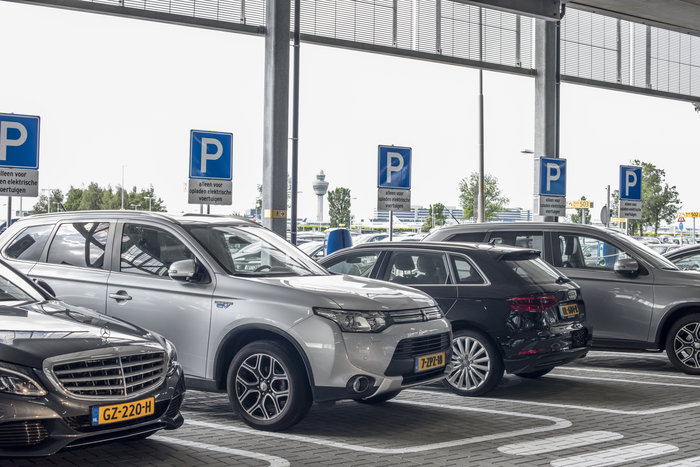Dr Max Hirsh (PhD, Harvard), a professor at the University of Hong Kong and a leading expert on airports and urban development, contemplates the future of airport parking.
Parking is one of the pillars of the airport business model: it’s the number one source of non-aeronautical income, and accounts for up to a quarter of total operating revenue. Last year, airports in the USA alone generated nearly US$6bn in parking and car rental fees. In other words: airport parking is big business.
But the viability of that business is being challenged by a major shift in how passengers travel to and from the airport. Over the past year, I’ve spoken to airport directors at 10 major hubs in the USA, Europe and Asia. They’ve all told me the same thing: although passenger numbers are up, demand for parking has leveled off, or is even declining. At the same time, ride hailing services like Uber, Lyft and Grab have emerged as a cheaper and more convenient way to get to the airport.
The popularity of these ride hailing apps presents both a spatial and a financial challenge. On the one hand, airports need to retrofit landside facilities to accommodate new forms of ground transportation; on the other hand, as fewer and fewer people pay to park (or rent) a car at the airport, airport authorities need to rethink how they monetize ground access.
These challenges will become even bigger over the next five to 10 years as the introduction of self-driving vehicles and dedicated airport-to-city rail lines produces a more complex modal split among both passengers and airport employees. How can airports tackle these changes head on?
Many airports are hesitant to have this conversation, for a variety of structural, financial and cultural reasons. As one of the main revenue centers, parking departments wield a lot of power within the airport authority, and are keen to keep it that way.
Moreover, some airports worry that talking about declining parking revenues may have a negative effect on their bond rating. But with so much public discussion about the disruptive effects of ride hailing and autonomous vehicles, it’s only a matter of time before lenders and rating agencies start asking some pointed questions about how airports are engaging with those technological disruptions. Successful airports will be sure to have a credible, and credit-worthy, action plan in place.
Cultural factors also explain why a lot of airports, especially American ones, are grappling with the paradigm shift in ground access. I grew up in a typical East Coast suburb, where the only people who took public transport were the ones too poor to own a car, and taxis were exorbitantly expensive. Driving was the only realistic way to get to and from the airport. It also had a social function: a true friend was someone who drove to the airport to pick you up, even during rush hour.
But those access patterns are changing. In aging societies, older passengers prefer to leave the driving to someone else, especially before or after a flight. And in most developed economies, younger people are remarkably uninterested in owning a car—or even in learning how to drive—compared to previous generations. Both of these trends have big implications. What, then, is the future of airport parking, and of the airport ground access model?
Ask parking operators, and you’ll likely hear that parking will continue to be a cash cow for years to come. Even if a smaller proportion of passengers choose to self-park, the operators argue that the overall growth in air traffic will deliver a steady supply of customers.
If you pose the same question to tech firms, you’ll be regaled with futuristic scenarios that envision an airport devoid of any parking at all. Passengers will be delivered to the terminal by autonomous vehicles—or travelers might forego ground transport altogether, transferring directly between airplanes and individual flying pods, akin to helicopters, that whisk them to their final destinations.
As someone who is both open-minded and pragmatic, I believe that the truth lies somewhere between these two extremes. It’s also clear that some airports will transform more quickly than others. Those that serve metropolitan areas populated by younger, tech-savvy or international travelers will be at the forefront of change, as urban leaders try to attract companies like Amazon by updating their cities’ transport infrastructure.
Meanwhile, airports in developing countries, in rural locations, and with predominantly short-haul traffic will face less pressure to innovate. Either way, the future ground-access model will need to creatively and coherently combine self-parking, ride hailing, autonomous vehicles and traditional mass transit. In moving toward that new model, airports need to focus on three key issues.
First, airports will need to come up with a new model for monetizing ground access, for example by introducing a flat per-person access fee. And with so much uncertainty surrounding the future of parking, they’ll need to reconsider whether now is really the best time to commission enormous new garages and CONRAC facilities. The answer? Probably not.
These structures won’t be ready until the mid-2020s, by which time they may very well be obsolete. (I’m looking at you, LAX.) Instead, successful airports will develop scenarios for multimodal ground transportation centers that can flexibly accommodate a variety of access modes, and that anticipate the different needs of passengers traveling on each of them.
Second, airports will need to expand their portfolio of non-aeronautical activities to compensate for the drop in parking revenue. They can start by redeveloping existing parking lots, garages and car rental facilities for alternative, income-generating purposes. That’s a scary thought for many airport operators – but it presents a tremendous opportunity to rethink the types of facilities and services that airports offer their customers on the landside, and to design a more attractive terminal forecourt.
At present, some of the airport’s most valuable real estate is occupied by parking structures. Successful airports are reevaluating whether that approach still makes sense. For example, Amsterdam Schiphol recently introduced a valet parking model, whereby passengers drop off and retrieve their vehicles at a designated area next to the terminal. While their owners are away, the cars are stored at a remote facility on the edge of the airport, thereby freeing up terminal-adjacent land for more lucrative purposes.
This brings us to the third issue, namely the future of parking operators and airport parking departments. Less successful ones will dig their heels in the ground, and burry their heads in the sand: they’ll ignore the disruptions taking place in their industry, and delay the effects for as long as possible.
Successful parking professionals, on the other hand, will endeavor to improve the quality of their existing product, for example by adopting the valet model discussed above, or by offering services geared toward particular customer segments, such as travelers with limited mobility.
They will also reposition themselves as mobility service providers, whose task is to ensure a smooth transition between air travel and a variety of ground transportation options.
There’s a definite need for that kind of expertise: right now, many airports accommodate ride hailing services on an ad-hoc basis inside parking garages, leading to significant safety and congestion issues. There are also a lot of open questions about how autonomous vehicles will interface with the terminal, and how they will be stored and maintained when not in use.
A truly future-oriented parking operator will propose innovative ways to redevelop existing facilities into ground transportation centers that can flexibly combine—and monetize—a wide range of transport modes under one roof.
The future of parking has much bigger implications beyond just airports. Parking lots and garages consume an enormous amount of valuable urban real estate, much of which may be rendered obsolete by new transport technologies and emerging mobility patterns. Opportunities for redevelopment abound. To be successful, these projects will require both creative thinking and close collaboration between parking operators, commercial developers, architects, engineers and urban planners. The same holds true for the future of airport parking.
 About the Author: Dr Max Hirsh (PhD, Harvard) is a professor at the University of Hong Kong and a leading expert on airports and urban development. He is the author of Airport Urbanism: a ground-breaking study on the increase in global air traffic and its implications for the planning, design and operation of airports. Read more on his thoughts on airports, urbanism and infrastructure on his website, www.airporturbanism.com
About the Author: Dr Max Hirsh (PhD, Harvard) is a professor at the University of Hong Kong and a leading expert on airports and urban development. He is the author of Airport Urbanism: a ground-breaking study on the increase in global air traffic and its implications for the planning, design and operation of airports. Read more on his thoughts on airports, urbanism and infrastructure on his website, www.airporturbanism.com

